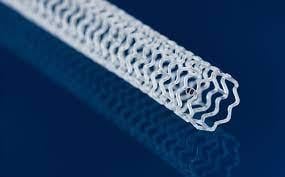
October 30, 2023 — Abbott announced late-breaking data from the LIFE-BTK clinical trial evaluating the Esprit BTK Everolimus Eluting Resorbable Scaffold System (Esprit BTK) in people with chronic limb-threatening ischemia (CLTI). CLTI is a severe stage of peripheral artery disease (PAD) due to advanced arterial blockage in the lower extremities. The LIFE-BTK trial met both of its primary safety and effectiveness endpoints, demonstrating that Esprit BTK reduces disease progression and helps improve medical outcomes compared to the current standard of care, balloon angioplasty.
Data from LIFE-BTK was presented as a late-breaking clinical trial at the 35th Transcatheter Cardiovascular Therapeutics (TCT) Conference in San Francisco and simultaneously published in the New England Journal of Medicine.
"Millions of people suffer from PAD. Yet, in the United States, there are currently no approved drug-eluting stents, drug-coated balloons or bare-metal stents available for use below-the-knee," said Brian DeRubertis, MD, FACS, New York Presbyterian-Weill Cornell Medical Center, and one of the principal investigators in the trial. "This underscores a pressing and substantial need for improved treatment options for people with CLTI and PAD. Results from the LIFE-BTK trial highlight the efficacy of Esprit BTK and its potential to deliver significant benefits in terms of opening blocked arteries below-the-knee and providing sustained treatment over time."
More than 200 million people worldwide have PAD with nearly 11% affected by CLTI1,2, a severe form of PAD. In these people, blocked vessels impair blood flow to the lower extremities, often leading to severe pain, non-healing wounds, and, in some cases, the need for limb amputation. Balloon angioplasty, a procedure in which a small balloon is inserted into the artery to open the blockage, is currently one of the approved procedures for people in the U.S. with CLTI. However, in many instances, the vessels become blocked again over time following balloon angioplasty, requiring additional treatment.
Abbott's Esprit BTK is a drug-eluting resorbable scaffold comprised of materials similar to dissolving sutures. Unlike metal stents, Esprit BTK is not a permanent implant, as blocked vessels only need support for a few months after the blockage is cleared. At that point, the vessel can stay open on its own, which is why Esprit BTK is designed to serve a temporary, yet crucial role.
The LIFE-BTK trial enrolled 261 people worldwide. The study aimed to investigate whether Esprit BTK could offer greater benefits than the current option of balloon angioplasty to open blocked arteries in the leg and to keep the arteries open. The trial's primary efficacy endpoint evaluated primary patency plus limb salvage (the ability of the vessel to stay open, and increasing the time until another intervention is needed). The trial met the efficacy endpoint and showed that Esprit BTK is superior to balloon angioplasty in lowering the risk of total obstruction of the target vessel, narrowing of the target lesion, major amputation and repeat interventions of the target lesion. The primary safety endpoint evaluating freedom from above-the-ankle amputation, major reintervention at six-months and death within 30-days showed that Esprit BTK was non-inferior (similar performance) to balloon angioplasty.
Results of the one-year LIFE-BTK clinical trial showed:
Esprit BTK had a significantly greater freedom from the primary efficacy clinical events of 74.5 vs 43.7% (balloon angioplasty) for people with CLTI.
The trial's powered secondary endpoints revealed that Esprit BTK was superior to balloon angioplasty at reducing vessel re-narrowing (25.8% improvement) and sustaining openness of the vessels (14.2% improvement).
"The LIFE-BTK trial data underscores the profound impact that Esprit BTK could have for millions with PAD," said Jennifer Jones-McMeans, divisional vice president of global clinical affairs at Abbott's vascular business. "With angioplasty, multiple interventions are all too common. The results from this trial demonstrate a compelling and meaningful development in clinical outcomes, ultimately helping people have less adverse events and reinterventions, enhancing their quality of life."
Based on the strength of the LIFE-BTK trial results, Abbott intends to submit the Esprit BTK Everolimus Eluting Resorbable Scaffold System for review by the U.S. Food and Drug Administration (FDA).
CAUTION: Investigational device. Limited by Federal (U.S.) law to investigational use only.
For more information: www.abbott.com
Find more TCT23 conference coverage here
Related Resorbable Stent Content:
Current State of Bioresorbable Stent Technology — details the issues raised in the ABSORB III Trial presented at TCT 2017
VIDEO: The Current State of Bioresorbable Stents in 2018 — Interview with Patrick Serruys, M.D.
Bioresorbable Stent Shows Good 5-Year Outcomes in ABSORB BTK Trial
The Next Step in Bioresorbable Stent Technologies
One-Year Results of the DISAPEAR Registry Positive for Absorb Stent
VIDEO: Poor Outcomes for Bioresorbable Stents in Small Coronary Arteries — interview with Gregg Stone, M.D., at ACC 2016
Abbott Will End Sales of Absorb Bioresorbable Stent
VIDEO: What Went Wrong With the Absorb Stent? — interview with Ajay Kirtane, M.D., at TCT 2017
VIDEO: Bioresorbable Stent Comparable to Xience at Two Years, With Concerns — interview with Stephen Ellis, M.D., at ACC 2017
Tempering the Bioresorbable Stent Euphoria Following FDA Clearance of the Absorb
VIDEO: Bioresorbable Stent Failure Modes, Technique, Patient Selection and Future Development — a discussion with Juan Granada, M.D.
Bioresorbable Stent Comparable to Xience at Two Year, But With Adverse Trends
VIDEO: Editor’s Choice of the Most Innovative New Technology at TCT 2018
VIDEO: Future Research and Development Efforts in Cardiovascular Medicine — Interview with Professor Ian Meredith, MBBS


 October 31, 2025
October 31, 2025 









